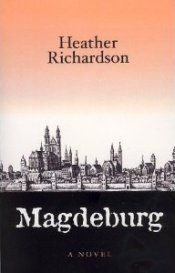Magdeburg by Heather Richardson: a powerful sketch of the Thirty Years' War
 Every once in a while, someone on Amazon or Goodreads or a library discussion site will ask for historical novels set during the Thirty Years' War. This was a series of conflicts fought between the Catholic Holy Roman Empire and Protestant German states and their allies between 1618 and 1648. There aren't many such books, at least in English-language historical fiction... probably because English-speaking countries weren't directly involved.
Every once in a while, someone on Amazon or Goodreads or a library discussion site will ask for historical novels set during the Thirty Years' War. This was a series of conflicts fought between the Catholic Holy Roman Empire and Protestant German states and their allies between 1618 and 1648. There aren't many such books, at least in English-language historical fiction... probably because English-speaking countries weren't directly involved.Titles frequently mentioned include A.L. Berridge's André de Roland series (Honour and the Sword, In the Name of the King) and Arturo Pérez-Reverte's Captain Alastriste books, especially The Sun Over Breda. All are swashbuckling adventure novels. Eric Flint has an alternate history series, too, which I haven't read. I'm sure you'll help me think of others!
For those of us who didn’t know much about the Thirty Years' War beyond how long it lasted, I highly recommend experiencing Heather Richardson's Magdeburg, which is set in 1630-31. The heroine is a young German woman, Christa Henning, a printer's daughter whose days are occupied with the family trade and domestic concerns, such as her best friend Gertrude's pregnancy and hasty marriage and caring for her “touched” younger sister, Elsbeth. Although the Hennings are Lutherans, the religious situation in Magdeburg is realized with nuanced complexity. Christa's father prints Catholic leaflets on the side, and discord is sown in the house when an ultra-pious pastor comes to stay with them.
Richardson also gives us the alternating viewpoint of the male lead (who I'll avoid calling the hero). Lukas Weinsburg is a sergeant marching with an imperial regiment as it makes its approach on Magdeburg. These scenes include all you'd expect of soldiers anywhere, not just the camaraderie, spitefulness, and excessive drinking but also the tedious routine and inaction.
Magdeburg’s residents go about their tasks while enduring the siege, determined to resist what they know is coming, and hoping that Sweden's king, Gustavus Adolphus, can arrive with his forces in time to save them. He doesn't.
War is a messy, chaotic business, but the author provides a lucid illustration of the larger political and religious picture as one group overtakes the other. I feel obligated to say something about the novel’s eleventh chapter, which is a haunting, poetic masterpiece. It opens: "It was midnight, but no one knew it." The perspective becomes omniscient as it roams away from Lukas and Christa to survey the city as a whole at its darkest hour. In a mere three pages of careful glimpses, Richardson conveys the enormity of the devastation, both material and personal.
I won’t reveal more of the plot, save to affirm that things don't end on that doleful note. Magdeburg's survivors struggle to regain their city and a sense of themselves. The characters are devoid of cliché, and whatever their views on religion, it's central to their lives. They don’t react like 21st-century people would, but our generation isn’t exactly free of violence springing from faith-based differences, either.
Magdeburgwas published by Belfast's Lagan Press in 2010 (trade pb, 349pp). You can snag it from Amazon UK or other online bookstores, or do what I did and order it directly from the publisher for £9.99 – which as I recall included postage.
Published on July 19, 2012 06:00
No comments have been added yet.



